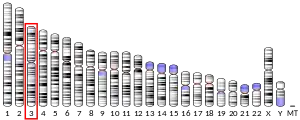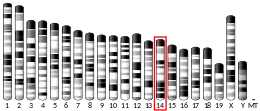RFT1
Protein RFT1 homolog is a protein that in humans is encoded by the RFT1 gene.[5][6]
| RFT1 | |||||||||||||||||||||||||
|---|---|---|---|---|---|---|---|---|---|---|---|---|---|---|---|---|---|---|---|---|---|---|---|---|---|
| Identifiers | |||||||||||||||||||||||||
| Aliases | RFT1, CDG1N, RFT1 homolog | ||||||||||||||||||||||||
| External IDs | OMIM: 611908 MGI: 3607791 HomoloGene: 5343 GeneCards: RFT1 | ||||||||||||||||||||||||
| |||||||||||||||||||||||||
| |||||||||||||||||||||||||
| |||||||||||||||||||||||||
| Orthologs | |||||||||||||||||||||||||
| Species | Human | Mouse | |||||||||||||||||||||||
| Entrez | |||||||||||||||||||||||||
| Ensembl | |||||||||||||||||||||||||
| UniProt | |||||||||||||||||||||||||
| RefSeq (mRNA) | |||||||||||||||||||||||||
| RefSeq (protein) | |||||||||||||||||||||||||
| Location (UCSC) | Chr 3: 53.09 – 53.13 Mb | Chr 14: 30.65 – 30.69 Mb | |||||||||||||||||||||||
| PubMed search | [3] | [4] | |||||||||||||||||||||||
| Wikidata | |||||||||||||||||||||||||
| |||||||||||||||||||||||||
Defects are associated with congenital disorder of glycosylation type 1N.[6]
See also
References
- GRCh38: Ensembl release 89: ENSG00000163933 - Ensembl, May 2017
- GRCm38: Ensembl release 89: ENSMUSG00000052395 - Ensembl, May 2017
- "Human PubMed Reference:". National Center for Biotechnology Information, U.S. National Library of Medicine.
- "Mouse PubMed Reference:". National Center for Biotechnology Information, U.S. National Library of Medicine.
- "Entrez Gene: RFT1 homolog (S. cerevisiae)".
- Haeuptle MA, Pujol FM, Neupert C, Winchester B, Kastaniotis AJ, Aebi M, Hennet T (March 2008). "Human RFT1 deficiency leads to a disorder of N-linked glycosylation". Am. J. Hum. Genet. 82 (3): 600–6. doi:10.1016/j.ajhg.2007.12.021. PMC 2427296. PMID 18313027.
Further reading
- Helenius J, Ng DT, Marolda CL, et al. (2002). "Translocation of lipid-linked oligosaccharides across the ER membrane requires Rft1 protein". Nature. 415 (6870): 447–50. doi:10.1038/415447a. PMID 11807558. S2CID 4419970.
- Strausberg RL, Feingold EA, Grouse LH, et al. (2002). "Generation and initial analysis of more than 15,000 full-length human and mouse cDNA sequences". Proc. Natl. Acad. Sci. U.S.A. 99 (26): 16899–903. doi:10.1073/pnas.242603899. PMC 139241. PMID 12477932.
- Rose JE, Behm FM, Drgon T, et al. (2010). "Personalized smoking cessation: interactions between nicotine dose, dependence and quit-success genotype score". Mol. Med. 16 (7–8): 247–53. doi:10.2119/molmed.2009.00159. PMC 2896464. PMID 20379614.
This article is issued from Wikipedia. The text is licensed under Creative Commons - Attribution - Sharealike. Additional terms may apply for the media files.



